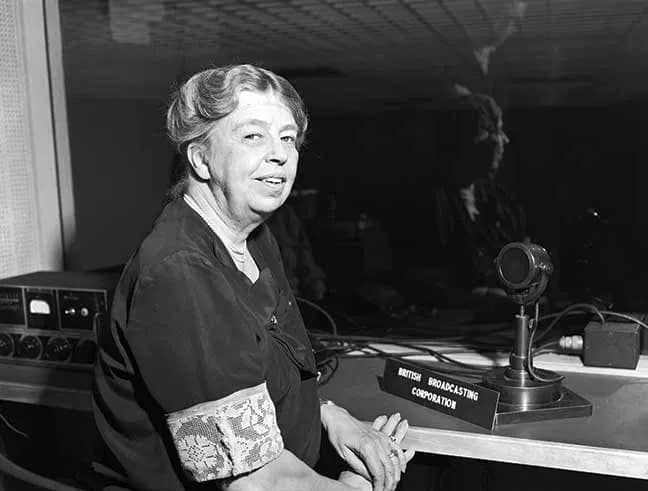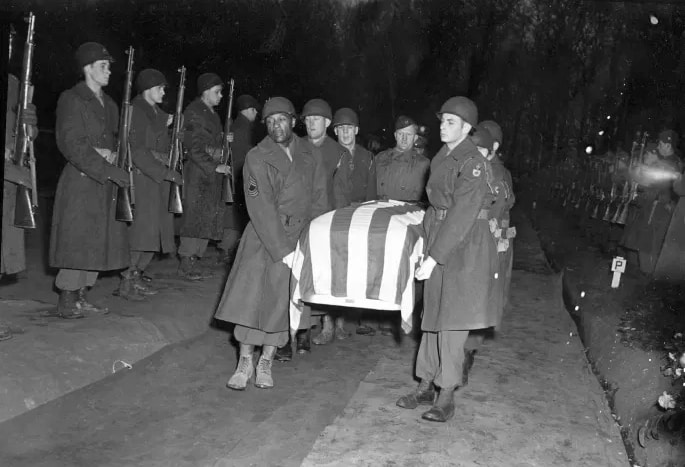
On December 19, 1945, Eleanor Roosevelt, widow of the late president, is appointed as one of the first U.S. delegates to the United Nations.
By Phil Kohn. Dedicated to the memory of his father, GM3 Walter Kohn, U.S. Navy Armed Guard, USNR, and all men and women who have answered the country’s call in time of need. Phil can be contacted at ww2remembered@yahoo.com.
On December 14, 1945, the Truman Administration intervenes in the Chinese Civil War by dispatching General of the Army George C. Marshall to China to negotiate a truce between the Nationalists and the Communist Chinese.
The United Nations announces on December 15 that its permanent headquarters is to be located in the U.S. In the Netherlands East Indies, the almost-two-month-long Battle of Ambarawa, in central Java, ends in a victory for the newly formed Indonesian Army as the British are forced to retreat to Semarang, some 10 miles to the north.
In Tokyo on December 16, Gen. of the Army Douglas MacArthur, Supreme Commander for the Allied Powers, orders the end of Shinto as the official religion of Japan. Former Japanese prime minister Fumimaro Konoe, central to transforming Japan into a totalitarian state in the 1930s and suspected of possible war crimes, commits suicide in his home by swallowing poison. The Sinclair Oil Co. ends a long wage dispute when it grants an 18% pay raise and a 40-hour work week to members of the Oil Workers International union.
The Senate on December 17 votes for the U.S. to assist in establishing a Jewish homeland in Palestine. In Japan, voting laws are amended to permit women to cast ballots.
In the U.K. on December 18, the House of Lords dismisses William Joyce’s appeal against his sentence of death for high treason. Joyce, as “Lord Haw Haw,” had broadcast Nazi propaganda over the radio from Berlin.
Eleanor Roosevelt, widow of the late president, on December 19 is appointed as one of the first U.S. delegates to the United Nations. The Swiss parliament passes a law allowing for the immediate expulsion from the country of any foreigner holding pro-Nazi or fascist views.
In Italy, on December 20, Edda Mussolini Ciano — Il Duce’s daughter and the widow of Italian foreign minister, Count Galeazzo Ciano (executed for treason in January 1944 because he had voted to remove Mussolini from power in July 1943) — is sentenced to two years in prison for aiding Fascism. Rationing of automobile and truck tires ends in the U.S. In the Soviet Union, seven Germans are hung in Smolensk for crimes against Soviet citizens, including murder and rape; three others charged are sentenced to long terms of forced labor. Over 50,000 Smolensk residents gather to watch the executions.
George S. Patton dies in his sleep in a hospital in Heidelberg, Germany, from a combination of fluid in his lungs and congestive heart failure. Karl Renner becomes the first president of a reconstituted Austria.
Both the United Kingdom and the United States on December 22 officially recognize the government of the Socialist Federal Republic of Yugoslavia, headed by Josip Broz Tito.
From Vatican City, Pope Pius XII on December 23 publishes an encyclical — Orientales omnes Ecclesias (“All the Eastern Churches”) — to the faithful of the Ukrainian Greek Catholic and the Ruthenian Greek Catholic Churches, commemorating their 350 years of union with Rome. After the war, many members of these churches have come under the rule of the Soviet Union, which is exerting pressure for church members to forsake Rome, abandon their church and join the Russian Orthodox Church (controlled by Moscow). In the document, the Pontiff writes: “We know that grievous snares are being set for your faith. There seems ground for fear that in the near future still greater hardships will befall those who refuse to betray their sacred religious allegiance.” (In fact, between 1945 and 1958, six Ruthenian bishops are murdered, sentenced to death or die in prison camps. In 1946, after continued persecution, the Ruthenian church is folded into the Russian Orthodox Church.)

On December 24, 1945, General George S. Patton Is laid to rest Gen. George S. Patton is laid to rest in the Luxembourg American Cemetery and Memorial in Luxembourg City, Luxembourg. Courtesy National Archives.
On December 24, the remains of Gen. George S. Patton are laid to rest in the Luxembourg American Cemetery and Memorial in Luxembourg City, Luxembourg.
On Guam on December 25, Rear Adm. Shigematsu Sakaibara of the Imperial Japanese Navy is sentenced by a military tribunal to death by hanging for ordering the execution on October 7, 1943, of 98 American civilians on Wake Island.
Adm. Chen Shaokuan is relieved as supreme commander of the (Nationalist) Republic of China Navy on December 26. Ordered by Chiang Kai-shek to attack Communist positions in Shantung Province, Chen refuses, stating that the navy had not recovered sufficiently from the war with Japan. The Gaoyou-Shaobo campaign in China ends in a Communist victory after a week of fighting. The Nationalist forces lose 80 artillery pieces, over 6,000 small arms and suffer over 4,000 casualties.
The Moscow Conference of Foreign Ministers takes place on December 27. Representatives of the “Big Three” powers — the U.K., the U.S. and the U.S.S.R. — meet and make some far-reaching decisions. Among them: international control of atomic energy; creation of a Far Eastern Commission and Allied Council for Japan; withdrawal of foreign troops from China; and an independent Korea within five years. As to the latter, despite the demands of many Koreans for immediate independence, the Allies agree to a four-part trusteeship (the Big Three plus the Republic of China) that over time will work out the governmental details of a unified and independent Korea. In the meantime, the Soviet Union will administer the nation north of the 38th Parallel, and the U.S. will administer south of it. Terrorist attacks are carried out against British military bases in Palestine, including a police station in Jaffa and an ammunition dump in Tel Aviv. In Washington, D.C., the International Monetary Fund (IMF) begins its official existence. First formed at the Bretton Woods Conference in 1944, the IMF has 29 member countries. The organization’s goal is the rebuilding of the international payments system.
On December 28, 1945, in Washington, D.C., President Truman signs into law the War Brides Act that exempts spouses and natural and adopted children of U.S. military service personnel from the immigration quotas and mental and health standards currently in force. A spokesman for the United Nations says that the organization will choose a site “in the general area” of either Boston or New York City for its permanent headquarters.
Koreans in Seoul attack U.S. soldiers on December 29 to protest the decision made at the Foreign Ministers’ Conference in Moscow on December 27 to wait for as long as five years before reinstating Korean independence. In the Soviet Union, the Politburo on December 29 approves Lavrenty Beria’s request to be dismissed as the head of the NKVD, the interior ministry, responsible for law enforcement and secret-police activities. (The “dismissal” is to allow him to focus on his secret new role in leading atomic-weapons research. Sergei Kruglov is named to replace Beria as head of the Soviet Internal Affairs Ministry (MVD), the re-named NKVD.) In Paris, the government announces that all air transport will be taken over by the state-owned airline, Air France.
Friedrich Gustav Bernhard, a German Lt. Gen. of Cavalry and Panzer commander, captured by the Red Army, is tried on December 30 by a Soviet military tribunal and found guilty of atrocities and war crimes in the Bryansk region of Russia, about 360 miles southwest of Moscow. He is hanged the same day. In the Netherlands East Indies, 2,600 U.S.-trained Dutch troops land at Batavia, Java, to reimpose colonial rule.
In the U.K., the British Home Guard is disbanded on December 31. Chiang Kai-shek announces his conditional acceptance of a Chinese Communist offer of a ceasefire in the Chinese Civil War. In Washington, D.C., the Marine Corps reports that, as of December 31, there are about 46,000 U.S. Marines stationed in northern China.
In Tokyo, Emperor Hirohito issues a proclamation on January 1, 1946, requiring that his subjects refrain from: believing that he is descended from divinity and the notion that they are superior to other races and destined to rule the world. The United Kingdom, India, and Thailand sign a treaty of peace in Singapore. In the U.K., London Airport (later renamed Heathrow Airport) opens to serve civilian air traffic. The results of the December elections for the Central Legislative Assembly for India are announced: the Indian National Congress wins half of the contested seats, while the Muslim League wins all seats reserved for Muslims.
King Zog I of Albania formally abdicates his throne on January 2. General strikes protesting French rule take place in Damascus, Syria, and Beirut, Lebanon. The U.S. Army partially lifts its ban against soldiers marrying enemy nationals, allowing GIs to wed Austrian women. (The prohibition against marriage to Germans continues.)
The Polish government on January 3 nationalizes all industries with over 50 workers and all businesses formerly owned by Germans. In London, William Joyce, who had broadcast Nazi propaganda over German radio during the war as “Lord Haw Haw,” is hanged for treason.



